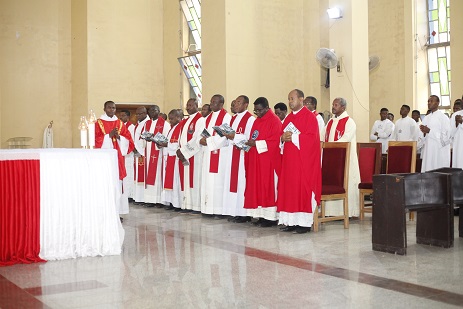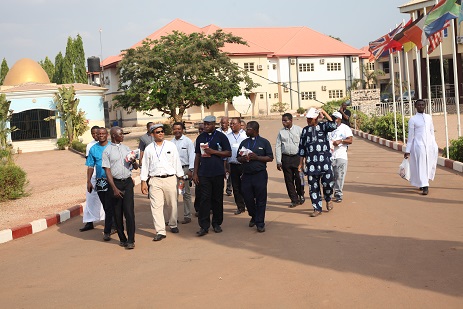Bigard Memorial Seminary, Enugu, from Monday, March 2 – Friday, March 6, 2020, played host to the rectors of the major seminaries of West African sub-region who convened for the 8th inaugural meeting of the seminaries’ committee of the Regional Episcopal Conference of West Africa, RECOWA (French: Confѐrence Episcopal Regionale de lˈAfrique de lˈOuest, CERAO).
On the evening of Monday, March 2, 2020, being the day of their arrival, the guest rectors were officially welcomed to Bigard Seminary, Enugu – Nigeria by the host rector, Very Rev. Fr. Dr. Albert Ikpenwa.

The seminaries’ committee meeting with the theme – Etiquette: Professional Conduct and Priestly Formation – was officially flagged off the next day with a votive Mass of the Holy Spirit presided over by the bishop of Enugu diocese, Most Rev. Callistus Chukwuma Onaga. The bishop who spoke through his delegate Rev. Msgr. Luke Adike lamented the ignoble attitudes and unprofessional conducts often noticed among priests. He expressed optimism that the convention will enable the rectors to review their formative strategies, chart options, and in the end, come up with resolutions for optimal results. Before the Mass ended, the rectors and other priests who graced the celebration took turns in introducing themselves.

The plenary session which lasted for three days was officially drawn to a close with a thanksgiving Mass on Friday, March 6, 2020. Before the final blessings, the rector of Christ the King Seminary, Kafanchan (Nigeria), Fr. Timothy Dogo, read out, amidst the applause of seminarians, a communiqué arising from the proceedings of the rectors’ meeting. In the communiqué, the rectors made three observations namely, that:
(1) Priestly formation is at the cross-road in West Africa, challenged by Western culture and emerging trends like post-modernity, relativism, loss of the sense of the sacred, materialism, etc. (2) In the past, it was acceptable to behave in certain standard normative ways that were sensitive to both the African culture and human civilization but today, some newer tendencies are emerging that are deep causes of concern. (3) There is a disturbing decline in priestly professional conduct among some priests.
Consequent upon the above concerns, the communiqué further highlighted the resolutions of the rectors which included but not limited to the following:
(1) The seminary formation program should incorporate studies on etiquette and professional conducts. This would include providing books on etiquette, organizing conferences, courses and seminars on good manners and professional conducts. (2) There should be a background-check and psychological test on seminarians in order to help them in their formation towards professional conduct. (3) Seminarians should be taught how to keep records, present good accounts and organize parish offices. They should imbibe the necessary virtues for the priestly life, learning how to be close to the sheep while maintaining a professional distance. (4) Increased attention should be given to programmes on human development. (5) The formators in the seminaries should take time to examine the students in relation to their manners of dressing, cleanliness and general conduct. (6) The formators should be good examples of professional conduct in the performance of their duties. They should avoid as much as possible becoming reference points of bad behaviours of seminarians or priests. (7) The formation process should seek ways to make the seminarians arrive at proper discernment of their vocation. (8) For deepening of formation, the formators are to be less involved with external ministry and avail themselves of the services of the primary assignment in the seminaries.

It is important to note also that the plenary session featured social events which included excursions to places of interest in Enugu Metropolis by the rectors; Gala Night Party which featured social presentations by seminarians of the host seminary, and lots of other interesting packages.

